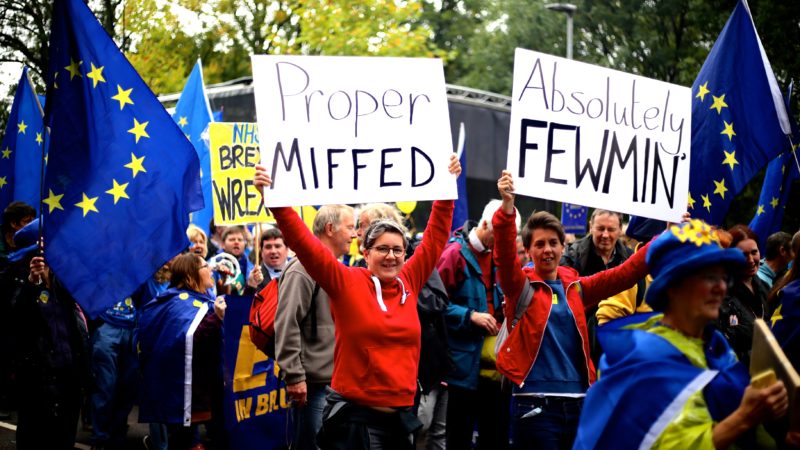Brexit is driven by a band of hard-right men. Let's stand up for the rights we've gained through the EU, says Best for Britain's Eloise Todd.

To celebrate International Women’s Day 2019, Best for Britain have compiled a list of 10 things the EU has done for women living, working and loving in the UK…
1. Maternity Rights
- Before being a member of the EU, UK women could be dismissed because of pregnancy, as it was seen as the equivalent to illness. EU law prohibited that.
- Thanks to the EU, UK employers MUST provide pregnant workers with at least 14 weeks paid maternity leave, of which 2 weeks must occur before birth.
- The EU Pregnant Workers Directive was instrumental in ensuring the health and safety at work of pregnant women and new mothers. When it was implemented in 1993, for example, it led to a right to paid time off for antenatal appointments, which was extended to many pregnant agency workers by another EU directive in 2011. UK employers must now give pregnant employees the option of parental leave and provide for paid time off for antenatal appointments during working hours.
- Employees are entitled to return to their job after maternity leave. And they can have extra time off for family reasons, accidents, or illness of children.
- And last but by no means least, prevents dismissal on the grounds of pregnancy ensures pregnant and breastfeeding workers are not obliged to perform duties that would jeopardise their safety or health.
2. Shared Parental Leave
- It was an EU law which gave men equally the same right as their partner to take parental leave. Men and women have equal rights of at least 18 weeks’ parental leave for each child.
3. Equal Pay
- EU law has driven the progression of employment rights for women and provided safeguards for UK employees that would not otherwise exist. Equality is enshrined under the Equal Pay Directive of 1975 and Equal Treatment Directive of 1976 ect under EU law. That means ff Equal Pay has direct e the principle can be relied upon directly by individuals in national court.
4. Prohibition on discrimination based on gender
- The EU charter binds the UK to abide by this crucial human right. However, the government has voted to scrap the charter. Therefore this right will become diluted if we leave the EU.
5. The EU ensures safety of women across borders
- EU law ensures restraining orders issued in one EU country are recognised in another member state.
6. Carers and the EU
- The EU prohibits discrimination against employees due to their carer status or relationship to a disabled person (Equality Directive 2000/43/EC & Coleman v Attridge Law, 2008 ECJ judgment)
- 58% of the 6.5 million unpaid carers in the UK are women – so this particularly protects women.
7. Enforcement
- EU Charter of Fundamental Rights and the underpinning of EU law, women are able to go to the European Court of Justice if they need to enforce their rights. The Governments withdrawal bill removes the jurisdiction of the court of justice. Outside the jurisdiction of the CJEU, women will be exposed and more vulnerable, with less avenues to enforce their rights.
- Enforceability of Workers Rights – employers must actively transpose EU law. For if the employer has breached Equal Pay laws, the point can be referred to the Court of Justice of the EU.
- In addition, women will no longer automatically benefit from future equality developments in EU law.
8. Governments HAVE to abide by equality protections
- Outside of the UK politicians will be free to remove and diminish protections for women, if they consider them too burdensome on employers, or too expensive, or undesirable for any other reasons…For example, In 2012, a Conservative MEP wanted to scrap pregnant worker and agency worker regulations calling them “barriers to employment” – he is now a Brexit minister.
9. LGBT+ rights
- Being a member of the European Union has strengthened the UK’s commitment to progress on LGBT+ rights. Campaigners used EU laws and structures to decriminalise of gay sex in Northern Ireland. UK trade unionists also operationalised EU law to make it illegal to discriminate against gay people in the workplace.
- The EU Court of Justice ruled that firing an employee for undertaking gender reassignment was sex discrimination. This has been instrumental for protecting trans rights at work.
- Whilst not an institution of the EU, our current membership requires us to be part of the ECHR, but the current government wants to leave post-Brexit.
10. Funding for women-led projects
- The EU has provided more than £8 billion in funding for UK women-lead projects over the last decade.
As Jo Stevens MP said: “Thanks to the EU, we enjoy guaranteed rights to flexible working and paid maternity leave which Jacob Rees-Mogg and his band of hard right men would love to sweep away if Brexit happens.”
Today let’s celebrate what we have and say no to sexist Brexit.
Eloise Todd is CEO of Best for Britain.
To reach hundreds of thousands of new readers we need to grow our donor base substantially.
That's why in 2024, we are seeking to generate 150 additional regular donors to support Left Foot Forward's work.
We still need another 117 people to donate to hit the target. You can help. Donate today.



